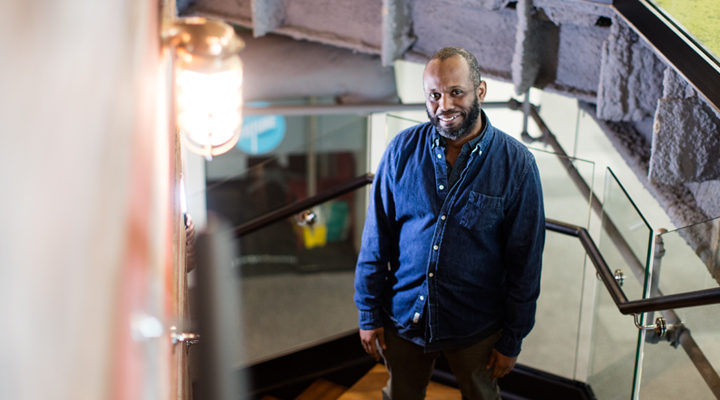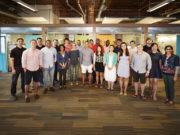In 2006, Tayyib Smith co-founded the Philadelphia-based Little Giant Creative boutique marketing and branding agency with his business partner Meegan Denenberg.
Little Giant works with a number of different high-profile brands and institutions, “helping them speak to audiences they might not otherwise speak to,” explains Smith. Their work has included an event series for Heineken called the Heineken Green Room targeting the youth of color market (ages 21-35) in Philadelphia and New York, and developing the first multicultural tourism campaign for the City of Philadelphia.
“A lot of the work we do on the for-profit side is specializing in cultural competency,” says Smith.
Fortunately, this kind of work dovetails nicely with Smith’s higher objective: social justice. While working with big names like Adidas and Red Bull, he is also able to pursue personal social justice-oriented nonprofit interests, including the Institute of Hip-Hop Entrepreneurship.
Prior to Little Giant, Smith worked in the music industry in A&R, managing and developing artists and DJs. Music and hip hop culture have always been an important factor in his life. Two years ago, he found himself brainstorming ideas at artist Theaster Gates’ Place Lab in Chicago and the idea for the Institute of Hip-Hop Entrepreneurship took root. He developed the concept and eventually submited it to the 2016 Knight Cities Challenge. It won.
The Institute of Hip-Hop Entrepreneurship aims to increase economic opportunity by using hip-hop to provide hands-on business training to members of low-income groups. Classes begin for the first cohort on November 12, and will involve nine months of training featuring one intensive weekend per month and shorter exercises throughout the month.
“We want to account for people who are already working or have kids,” says Smith. “The tech scene and incubators tend to be exclusionary concepts — it’s a tough schedule for people who might not come from a family of means. We wanted to be accommodating and adaptive to the community’s needs.”
They received 300 applicants for the first cohort, which was whittled down to 24. The selection criterion was not a matter of rewarding those who have already achieved the most: What they looked for was desire, hustle, the ability to follow-through and strong communication skills. Ultimately, success with this program is not just what participants learn but also the relationships they form while there and gaining a new understanding of entrepreneurship.
“We want people to create a pathway to fiscal literacy and be able to be part of an ecosystem that lives beyond this cohort,” explains Smith. “Hopefully we introduce them to a new way of thinking about working for a small business and giving them continued resources to start their own, showing them the pathway to careers and preventing them from being caught up in urban ills, lack of resources, or being marginalized. We want them to see that there are ways to independently create their own businesses.”
He also wants to highlight people who have already made the transition from the influence of hip-hop to sustainable careers.
“I’m 45 [years old] now and I’ve witnessed that sometimes the pathway to success might be longer than you expect,” he muses.
Classes are held at Pipeline Philly, a Center City co-working space for entrepreneurs, startups, independent professionals and small business teams. (Smith is a partner.)
Smith’s next project is to launch a sister nonprofit to Little Giant called Creative Cities Lab, an equitable community development lab similar to Place Lab in Chicago. Creative Cities will convene 50 to 75 social entrepreneurs, activists, innovators, policy makers, real estate developers — really anyone who is passionate about investing in cities — to discuss equitable development by addressing the systemic factors that disproportionately affect minorities in America, including poverty, racism and lack of resources.
These meetings will bring together people from around the country and the globe to focus on potential solutions for a more equitable future, which will include the development of fair and accessible pathways to education and home ownership.
This ongoing convening series will begin with a three-day conference in Philadelphia followed by smaller working groups in Oakland, Miami, Detroit and New Orleans. Smith is targeting the first activation for the second quarter of 2017.
This profile was originally published by Urban Innovation Exchange in partnership with Meeting of the Minds and Kresge Foundation. For more stories of people changing cities, visit UIXCities.com and follow @UIXCities.
Photo credit: Neal Santos



